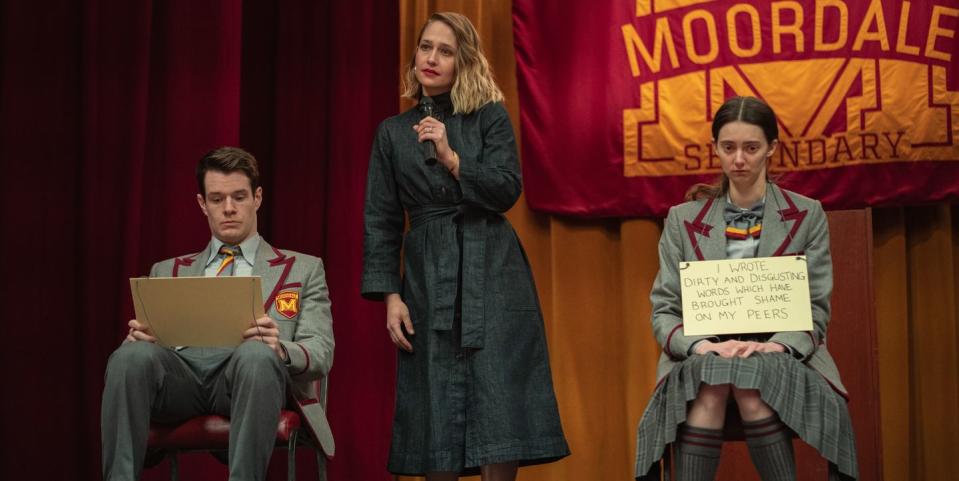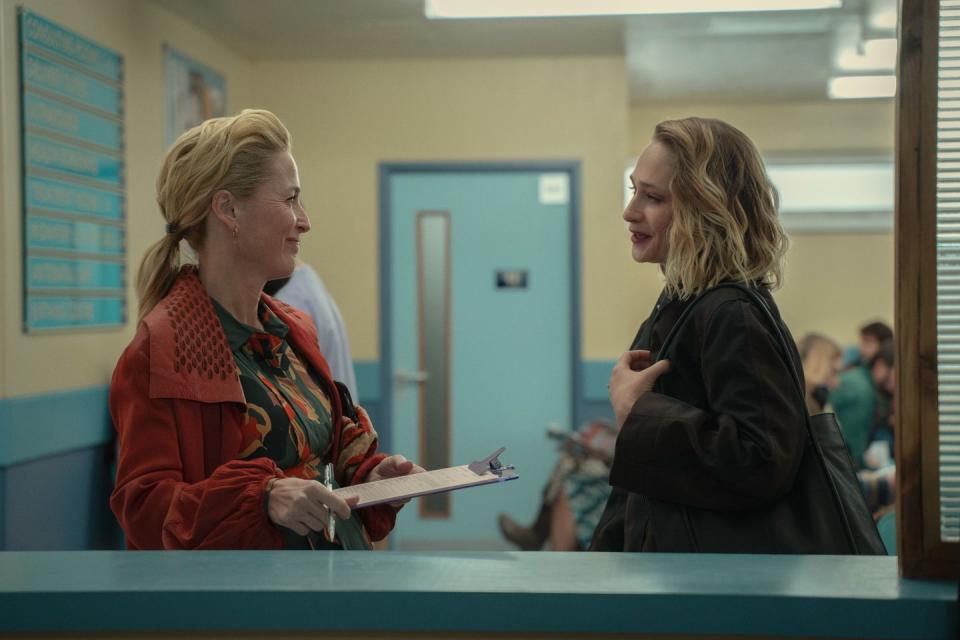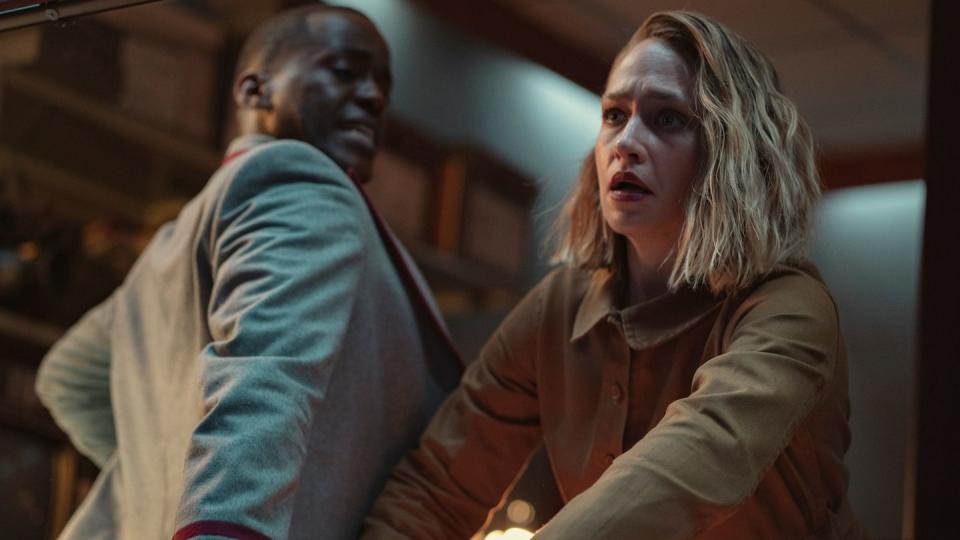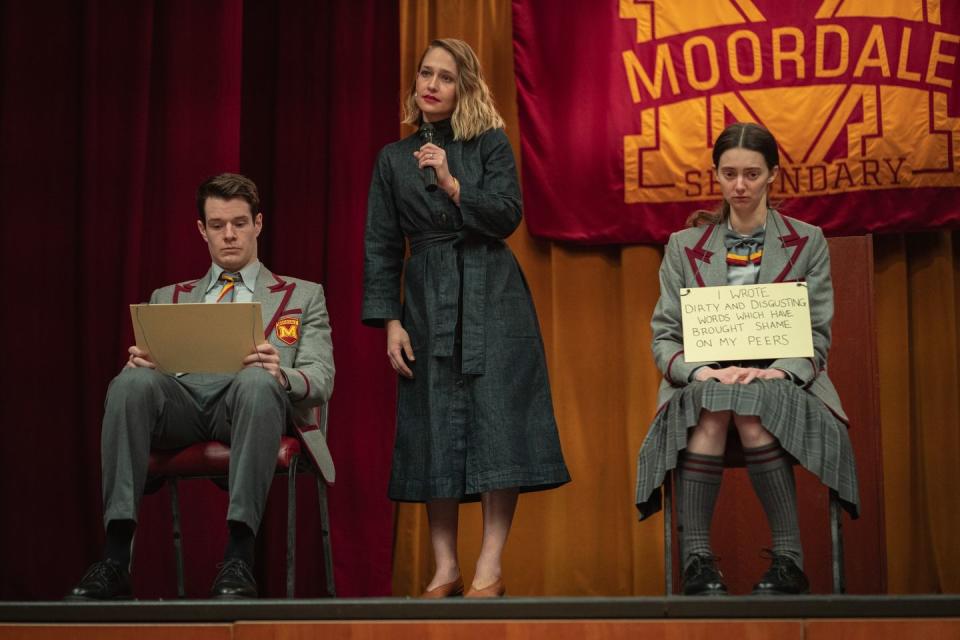Sex Education made a misstep with one season-3 storyline

Sex Education spoilers follow.
The depth of our love for Sex Education is so great that we find it something of a challenge to analyse the Netflix series with a critical eye, which is a testament to the capabilities of its creator Laurie Nunn and her team of writers. After three seasons, we remain fiercely protective of and invested in the comedy-drama's many faces, celebrating their successes, mourning their failings and waiting with bated breath to find out what will happen next after another eventful finale.
Once again, it cemented itself as one of the most brilliant and vital pieces of television ever to grace the small screen, which we make abundantly clear in our review of the latest chapter. But there was one storyline which didn't quite work, and it involved Jemima Kirke's Headmistress Hope Haddon, one of three new characters parachuted into the fray.

When she first bursts onto the assembly hall stage, boogying to Wilson Pickett's Land of 1000 Dances, Moordale's students are instantly seduced by her.
"She's cool," whispers Eric, visibly buoyed by the presence of the anti-Mr Groff. "Teachers aren't supposed to be cool."
Hope instructs the teens to call her by her first name, she's dressed like a Weekday model, topped off with a shade of lipstick that even Ruby approves of, and she seamlessly rouses the crowd sat before her, like a less aggressive Jordan Belfort.
But little does anyone know what she really has in store.

Slowly but surely, Hope implements a series of measures, some more repressive and archaic than others, which are designed to overturn Moordale's reputation as the "Sex School" and present it as a bastion of academic brilliance and, crucially, discipline. And in Hope's eyes, the only way to whip the institution into shape is by stripping the pupils of their individuality in favour of homogeneity.
She stuffs them into uniforms, gender identity be damned, demands everyone walk in single file like geese, rolls out a diabolical RSE curriculum, and snuffs out – or certainly attempts to – every ounce of self-expression, be that Ola's LGBTQI+ pin or Maeve's dip-dye hair.
One of Hope's especially cruel and unusual punishments involves hauling Adam, Lily and Cal up in front of their peers and ordering them to verbally self-flagellate, the content of which must remain hung around their necks on cardboard signs until she orders their removal. Dolores Umbridge, eat your heart out.
But with Hope, there is more than meets the eye, as is the case with every other character in Sex Education. The series wants you to understand that there is always something behind the mask and for Hope, that is pain.

She desperately wants to have a baby and has turned to IVF to make that happen. It's unclear how many failed rounds she has already endured, but the doctor's suggestion to look at "other options" indicates that Hope has been in this position on more than one occasion. And it's evidently taking a toll on her relationship with her husband, who is absent from her latest consultation.
That scene is a rare moment of vulnerability for Hope, who strives to appear unshakeable and in control during her duties as the head of Moordale. It's a fleeting window into her emotional landscape, and although she does retain that same steel which she uses to topple her enemies, demanding that they commence with another round despite the doctor's conflicting advice, her pain is palpable.
But Hope's burden is just one of multiple storylines being juggled in season three, many of which could comfortably sustain series of their own; as a result, it falls to the bottom of the pile, which wouldn't be a problem if the subject matter wasn't IVF, a weighty, highly emotive, multi-stranded topic which demands attention to detail but ultimately, was left dangling in this instance.

Sex Education's responsible handling of some really knotty, delicate subjects has earned it widespread praise, but while its treatment of Hope's infertility difficulties doesn't entirely deviate from that – we certainly wouldn't describe it as tone-deaf or reckless – it does feel more like a device used to generate sympathy with Hope and the darker aspects of her character, rather than an authentic attempt to unpack her trauma.
Over the course of the series, she displays numerous microaggressions – when she first meets Adam and Jackson, she assumes that the former is the "famed head boy" – she consistently denies Cal's identity, and the ease with which she publicly shames any dissenters, as they are framed under the new regime, is alarming.
She is a dictator, but to spare Hope the full extent of your vitriol, her longing for a child has been chucked in there – and we really do mean chucked – to earn her a smidgen of your pity.
Sex Education always strives to illustrate why people are the way they are. None of us exist in a vacuum, after all. From emotionally repressed dads to absent mums, we are shaped by the environments in which we grow. But in Hope's case, it would have been satisfactory for her to just be the villain of the piece without any deep-seated inner turmoil fuelling that.
She could have just been a stickler for authority and rule, or a woman who has substantial career aspirations. With the school board, parents and the press breathing down her neck at every opportunity, her anxieties are certainly justified. As a former Moordale student herself, who speaks about restoring the school to its former glory, that would have been enough.
But it's impossible not to equate her lack of real control when it comes to having a biological child with her stringent need for absolute, unflinching control in her job, and that really does feel like a disservice to Hope's IVF storyline.
You Might Also Like

 Yahoo Finance
Yahoo Finance 